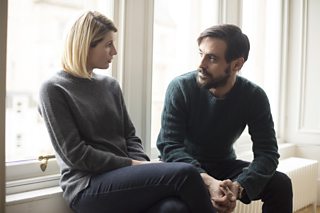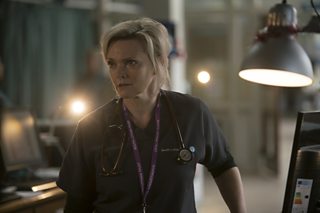You have an unusual career combination of Doctor and Screenwriter, how did that happen? What was your first break in screenwriting?
It’s not that unusual! Quite a few doctors makes the swerve into TV. , , , (Trainspotting). Also Paper Mask writer went on to script big Hollywood features. I think there are actually a lot of transferable skills. The ability to work hard to deadlines, to get things done under pressure are key to writing for television.
My break was on back in 2001. It was just starting as a entry point for new writers. A friend of mine was script editing it and I pitched her an idea. She liked it and I got to write a script. That episode got made, with in the lead guest role. For a student of TV comedy this was a huge deal. I was hooked. Then I had to learn to write. It meant teaching myself, but that was something I was used to as a doctor. In the old days that was how University worked!
Watch the trailer for Trust Me
What made you return to working in the medical profession after your screenwriting took off?
I realised that working part time as a doctor gave me fresh experience and fresh ‘input’ that I needed as a writer. Also another income took the pressure off having to say yes to every potential writing job. It gave me the space I needed to write original material. That was a key choice in my career. I took a break from writing on other people’s series and wrote an original spec' pilot. That got me original script commissions.
You’ve written for many different kinds of shows including medical but also others like , and . What made you want to return to the medical world for Trust Me?
grew out of trying to find a fresh take on a ‘medical show’ and also wanting to write about the kind of flawed protagonist that US cable shows were making work so well. It seemed an obvious thing to do but there was a lot of resistance about whether we would ‘like’ the character of in Trust Me. I thought this was the wrong question. For me, the way POV (point of view) works in writing forces you into the mind of the protagonist. You can’t help identifying with them. Then they do something bad and things suddenly get interesting. This idea has compelled audiences all the way from Macbeth, via to and . With Cath, the idea was similar. What happens if a good person starts to lie?

Trust Me (Karen (LOIS CHIMIMBA), Ally (JODIE WHITTAKER)(Photo credit: Image Credit: ±«Óătv/Red/Mark Mainz)
What’s the development process for a show like Trust Me? Did you have to write a pitch or treatment first?
I wrote several treatments and pitches, at least two ‘bad’ versions that didn’t get traction. However useful notes from production executives shaped it along the way. But it wasn’t until and at got hold of it that it moved forward. They could both see the potential in what I had always thought was a very strong hook - a medical show where the doctor isn’t really a doctor. at the ±«Óătv liked it too and commissioned a script for the first episode. He had interesting thoughts on the subtle class differential between nurses and doctors. The process really started from there.
What’s your working process? Character or story first or are they indivisible?
For Trust Me it was immediately clear that the character of was going to be a ‘good’ person who did a bad thing. So her character and background were constructed to make her virtuous, long suffering and almost a little self righteous. A ‘black and white’ thinker was going to be cast into a world of grey areas. Someone who trusts the system and who is devastated when the system betrays her. A naive woman. Everything else spiralled from that.
Do you plot out the storyline for the whole series before working on the individual episodes?
I always knew the end would involve moral compromise for Cath. She would end up trapped into lies and deceit, becoming part of the corrupt system when she’d previously stepped outside and tried to change it. It was always a ‘tragedy’. Although the ending I think is surprising, it is in my mind still a tragedy for the character. However the exact details emerged after we had the green light to make the show. The process was pretty smooth despite that. The main challenge was seeing how long you could hold tension and play the ‘will she get found out’ card. For me the mid point twist of having the Andy character find out the truth and then offer to help her is the key point in the story. At that point, she’s doomed as a character, but you still want to know how her fate will play out.

Trust Me (Ally (JODIE WHITTAKER), Dr Andy Brenner (EMUN ELLIOTT)(Photo credit: ±«Óătv/Red/Mark Mainz)
How many drafts of the script do you write?
That depends. I always write every draft expecting it to be shot. There are no ‘rough’ drafts. Notes come and they are discussed and the script is changed. Usually things get better. As I’ve become more experienced I’ve realised there’s always a new way which will work better, or at least just as well. On Trust Me we pretty much filmed the story I wrote, but certain beats were moved around to good effect in the script writing process. It was refined rather than re-thought. We were working to a tight delivery date for the ±«Óătv and I think in retrospect we had just enough time to deliver a good show.
What’s the script-editing process like and how do you deal with notes? What do you find most or least helpful from a script-editor?
A good editor/producer saves you time - in fact they make it possible to deliver - because they can see stuff that you are too close to see. It’s never ‘easy’ to take notes, but if you’re working with someone you respect and trust, you find it easier to believe them. Having said that, there are a minority of people who make scripts worse and the best course of action is just not to work with them again.
Script Editor is a weirdly anachronistic role in British TV. In effect when you are changing story structure, you are writing. Screenwriting is story and structure, but thanks to our history in radio and theatre, many people are obsessed with dialogue and see that as ‘writing’. So in effect I believe script editors are working as co-writers. Perhaps the key difference is that a writer needs to have some bigger idea about what they want the final work to be. So a good script editor/producer is always collaborating on the question - what effect are we trying to achieve? Is this happening? Can we make it better, tighter, cleverer? Will the audience feel what you want them to feel? What you don’t need is someone trying to create a different show. If they want to do that, they should go and write it themselves and good luck to them. They’ll find it’s hard!
My personal bugbear is the idea that something ‘works’ or ‘doesn’t work’. Good writers are like character actors. They use different performances, different voices to achieve an effect on the audience. They make choices. There’s not one ‘right’ way. Writers must be free to try things. I find the idea that a writer is limited by a ‘voice’ unappealing. I think it can sometimes be a way of placing a writer in a box. For me growing as a writer is not developing a voice but disappearing from the work.
The idea that someone - an exec' or an editor - ‘knows’ the right answer is corrosive. A writer is constantly challenged with the idea that what they are writing might not be the best version of the story they are trying to tell. Non writers need to be humble enough to go on the same journey when it comes to their own ideas.

Trust Me (Dr Brigitte Rayne (SHARON SMALL) (Photo credit: ±«Óătv/Red/Mark Mainz)
Do you write with specific actors in mind or have a say in casting?
I don’t but I do get involved with casting. It’s important to have a voice in that discussion but also be open to how a clever bit of casting changes a character for the better. Also hearing an actor read always inspires me because I automatically hear their voice and can write stuff I know they’ll do well. Working with Red was great because I was across all the casting choices and had a ‘vote’ (if not a veto!). You don’t always agree but to be honest there are so many great actors around you’re usually rejecting very good people. I sort of want to write to them all and tell them, but that would probably be weird.
Do you go on set?
I do go on set, especially on my own shows, and when I have a good relationship with the director. However it’s a tricky balance and you need to make sure you’re helping! Directors need the actors to trust them. Sometimes a writer can help on set by clarifying motivation or character. What I find works best is to have time to sit down with the director before the shoot. On and I spent a lot of time going through the script, discussing the shots I’d seen in my head and how she saw it. By the time the cameras rolled we both knew what we wanted and it worked really well.
Watch a Q&A with writer/co-producer Dan Sefton, actor Sharon Small and executive producer Gaynor Holmes.
Have you got any advice that’s been particularly useful to your writing or that you can share for other writers?
The one thing no-one seems to do is read books. Maybe it was my medical background but I read every screenwriting book I could find, comparing the ‘systems’ and looking for common ground. There’s so much experience there. If you think that a deep understanding of narrative and story is limiting, then you’re frankly delusional. Reject it if you want, but don’t reject what you haven’t understood. Whenever I work with someone who rejects structure, I find they simply take much longer to get to a story which ultimately displays a form of recognisable structure. Writers (and editors/producers) need to speak a common language of narrative. If you want to leapfrog fifty percent of the writers in the UK, read a book!
As I’ve got better at writing (and you do get better, and it takes a long time) I’ve realised that one of the key ideas is to create strong characters and place them in an interesting dilemma. That sounds obvious, but often isn’t done. Then challenge them with incident. Something has to happen. And then be utterly ruthless in pursuing what you believe that character would actually do in response. Not what moves the plot in a way you find convenient. What would they do? The same goes for the other characters. Each one has to have their own mind, be starring in their own movie. Each must pursue their own rational self interest. They all want something. When those paths clash, you’re getting somewhere. Repeat the process.
Two ideas clash here. To get a compelling narrative, something extraordinary has to happen. This challenges suspension of disbelief. To sustain it, you need to make the subsequent actions completely believable in terms of human psychology. I was interested that some of the critique of Trust Me was ‘how does she get paid?’ ‘What about her ID?” As a writer I knew the answers to these question but didn’t choose to show it. Clearly some people found that challenged their suspension of disbelief. But would more exposition have turned off more people than it helped? It’s a very difficult call to make.
With Trust Me, Cath loses her job in a way she finds deeply unfair. She’s got no money, she’s got a dependent daughter, a demented father and a dead beat ex. But more than that, she’s suddenly lost her faith in the fairness of the world. Her friend throwing away her career (perhaps a little too literally!) is the final straw. She has been challenged (ejected from her comfortable existence) and then she takes extreme action - she - steals her best friend's identity and goes to Edinburgh to pretend to be a doctor. That’s less than 15 minutes on screen but by that time (whether you buy it or not) something interesting has happened. Almost every other beat of the plot is a response to that character trying to make that deception work and avoid being found out. The other characters have their own needs and pursue them. Brigitte needs a friend and this challenges Ally. Andy seems like the perfect man but has he got a dark, obsessive side? They have wants - they are their own characters. When I read a script that gets to fifteen minutes and it’s just been pretty chat about not very much, I’m tuning out. In theatre people have bought a ticket, they're probably going to stick it out, at least until the interval. The emperor’s new clothes factor helps as well. Maybe the reason this is boring is that I’m not clever enough?
However on TV, it’s a blood sport. Every second of an audience’s attention is lent to you grudgingly. There’s no sunk cost commitment, just a finger on a button. There’s always something better on the other side. Now there are hundreds of other sides. Your seconds are ticking away. You cannot afford to waste any of them.
